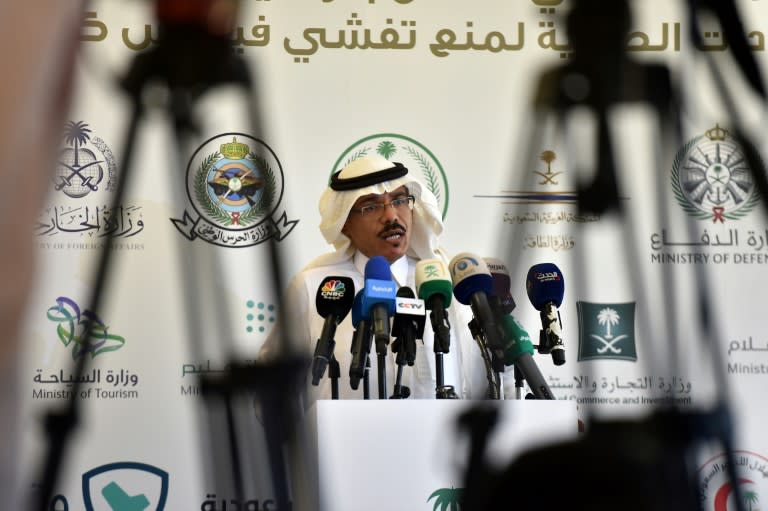BIOPOLITICS; ETHNIC CLEANSING THROUGH QUARANTINE
AFP•March 8, 2020

Mohammed Alabed Alali, Saudi Arabia's health ministry spokesman, addresses reporters in Riyadh as authorities cordoned off the eastern Qatif region in a bid to contain the fast-spreading coronavirus (AFP Photo/FAYEZ NURELDINE)
Riyadh (AFP) - Saudi authorities Sunday cordoned off the eastern region of Qatif, a centre of the kingdom's Shiite minority, in a bid to contain the fast-spreading coronavirus as the total number of cases rose to 11.
The lockdown on Qatif, home to around 500,000 people, is the first action of its kind across the Gulf region that has confirmed more than 230 coronavirus cases -- most of them people returning from religious pilgrimages to Shiite-majority Iran.
"Given that all 11 recorded positive cases of the new coronavirus are from Qatif... it has been decided... to temporarily suspend entry and exit from Qatif," the interior ministry said in a statement carried by the official Saudi Press Agency.
Except for essential services such as pharmacies and gas stations, work will stop in all government and private institutions in Qatif, the statement added.
The lockdown, although the ministry said it was temporary, risks fuelling resentment in the flashpoint region whose residents have long accused the Sunni-dominated government of discrimination, a charge Riyadh denies.
Saudi Arabia's Eastern Province -- which includes Qatif -- has seen bouts of unrest since 2011 when protesters emboldened by the Arab Spring uprisings took to the streets.
Saudi Arabia has condemned arch-rival Iran for allowing its citizens entry without stamping their passports.
The Saudi government has reminded its nationals of a standing ban on travel to Iran, as the two countries are locked in a battle for regional supremacy.
Iran is home to key shrines and pilgrimage sites for Shiites, who make up between 10 and 15 percent of the kingdom's population of 32 million.
The lockdown comes after the kingdom suspended the "umrah" year-round pilgrimage over fears of the disease spreading to the holy cities of Mecca and Medina in western Saudi Arabia.
The unprecedented suspension of the umrah has raised uncertainty over the annual hajj pilgrimage, scheduled for the end of July.
The pilgrimages, a major source of revenue, could also be a source of contagion and the move mirrors a precautionary approach across the Gulf to cancel mass gatherings -- from concerts to sporting events.
Bahrain's Formula 1 Grand Prix scheduled for March 20-22 will be held without spectators, the organisers said Sunday, in the latest sporting event to be affected by measures to contain the disease.
Saudi Arabia is also grappling with a coronavirus-led slump in oil prices just as it seeks to raise funds to finance Crown Prince Mohammed bin Salman's ambitious economic transformation plan.

Mohammed Alabed Alali, Saudi Arabia's health ministry spokesman, addresses reporters in Riyadh as authorities cordoned off the eastern Qatif region in a bid to contain the fast-spreading coronavirus (AFP Photo/FAYEZ NURELDINE)
Riyadh (AFP) - Saudi authorities Sunday cordoned off the eastern region of Qatif, a centre of the kingdom's Shiite minority, in a bid to contain the fast-spreading coronavirus as the total number of cases rose to 11.
The lockdown on Qatif, home to around 500,000 people, is the first action of its kind across the Gulf region that has confirmed more than 230 coronavirus cases -- most of them people returning from religious pilgrimages to Shiite-majority Iran.
"Given that all 11 recorded positive cases of the new coronavirus are from Qatif... it has been decided... to temporarily suspend entry and exit from Qatif," the interior ministry said in a statement carried by the official Saudi Press Agency.
Except for essential services such as pharmacies and gas stations, work will stop in all government and private institutions in Qatif, the statement added.
The lockdown, although the ministry said it was temporary, risks fuelling resentment in the flashpoint region whose residents have long accused the Sunni-dominated government of discrimination, a charge Riyadh denies.
Saudi Arabia's Eastern Province -- which includes Qatif -- has seen bouts of unrest since 2011 when protesters emboldened by the Arab Spring uprisings took to the streets.
Saudi Arabia has condemned arch-rival Iran for allowing its citizens entry without stamping their passports.
The Saudi government has reminded its nationals of a standing ban on travel to Iran, as the two countries are locked in a battle for regional supremacy.
Iran is home to key shrines and pilgrimage sites for Shiites, who make up between 10 and 15 percent of the kingdom's population of 32 million.
The lockdown comes after the kingdom suspended the "umrah" year-round pilgrimage over fears of the disease spreading to the holy cities of Mecca and Medina in western Saudi Arabia.
The unprecedented suspension of the umrah has raised uncertainty over the annual hajj pilgrimage, scheduled for the end of July.
The pilgrimages, a major source of revenue, could also be a source of contagion and the move mirrors a precautionary approach across the Gulf to cancel mass gatherings -- from concerts to sporting events.
Bahrain's Formula 1 Grand Prix scheduled for March 20-22 will be held without spectators, the organisers said Sunday, in the latest sporting event to be affected by measures to contain the disease.
Saudi Arabia is also grappling with a coronavirus-led slump in oil prices just as it seeks to raise funds to finance Crown Prince Mohammed bin Salman's ambitious economic transformation plan.
---30---
No comments:
Post a Comment